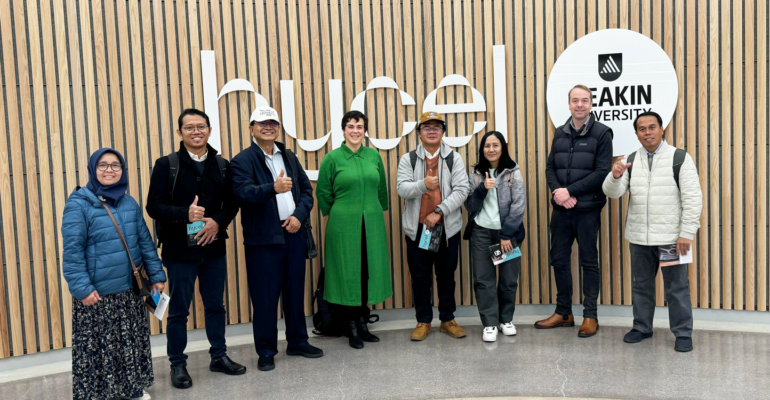IPB University visits Deakin University, Exploring Cooperation Opportunities

IPB University visited Deakin University in Melbourne-Victoria Australia (1-7/9). The visit with the mission of strengthening cooperation in education, training and research is an important momentum for IPB University in encouraging international collaboration with world universities.
On this occasion, the IPB University team was coordinated by the Director of Global Connectivity of IPB University, Dr Eva Anggraini with Prof Tridoyo Kusumastanto, Prof Yonvitner, Dr Handian Purwawangsa, and Andy Afandy, MM.
While in Melbourne, the team visited Deakin University’s marine field station in Queenscliff. The field station is a form of partnership station between Deakin University, the Victorian state government and the Australian government.
The scheme allows for the shared use of facilities, resulting in a strong infrastructure and quality research that meets the needs of the country. Joint management provides many conveniences between universities and the government in solving fisheries and coastal issues in Melbourne.
On this occasion, the Chief of the Centre for Coastal and Marine Resources Studies (PKSPL) IPB University, Prof Yonvitner explained several research and cooperation opportunities in the field of marine and fisheries between Deakin University and IPB University that need to be followed up.
After Queenscliff, the IPB University team then visited the Deakin campus at Waurn Ponds, Geelong. The first session of the visit was to visit Deakin University’s Biofactory. This biofactory is a technical installation unit that spearheads research towards various products for industrial consumption.
Some of the research related to the marine field includes feed produced by the laboratory, which has become commercial-grade goods. Extraction of algae from seagrass and macroalgae as a component of biomass material in reducing carbon. In addition, the utilisation and development of bioenzymes and products from organic waste and food waste into biomass and various fertiliser products.
“The various industrial engineering products produced by Deakin University become the bridging that makes all the innovations facilitated into various industrial materials. A research-based university and entrepreneur university model is proof that there is connectivity between universities and industry. Industry, in turn, uses the role of universities by spending funds to solve any problems faced,” Prof Yonvitner said.
After visiting the Biofactory, the team then discussed various collaborations with the research team and professors at Deakin University. Some of them were with Deakin’s Vice Rector for Cooperation Prof K Baskaran, Prof Lambert Brau, and Dr Aaron Schultz.
Furthermore, a visit to Deakin’s Warrnambool Campus was one of the most popular parts of the programme. Warrnambool Campus which is located about 184 km from Geelong or 255 km from Melbourne became the installation visited by the IPB University team. Warrnambool as one of the campuses directly facing the Indian Ocean leads to the Antarctic part being the centre of marine development at Deakin. The installation that became the principal of IPB University’s visit was the marine research installation led by Prof Daniel Ierodiaconou.
“On this occasion, we were also shown the research programme carried out in the South Sea of Australia, including the integrated data system designed in the Integrated Marine Observing System (IMOS) which is jointly managed by the campus and the Australian government. All existing data from all monitoring conducted in Australia can be accessed in IMOS from Deakin research institute,” said Prof Yonvitner.
The IPB University team also visited the Hydrocell infrastructure. This facility is an infrastructure built to collect all the hydrogen in the condensed air. This hydrogen is then prepared in the industrial installation of alternative energy raw materials that are being prepared by the Australian government through Deakin University. After Warrnambool Campus, the team continued their journey back to Deakin Campus in Geelong.
“The final part of this visit, IPB University and Deakin University agreed on several collaborations in the field of education including potential cooperation opportunities for undergraduate students utilising semester 7 at Deakin, Double Degree programs, Joint Supervisor, Adjunct Professor, and Internship programs,” explained Prof Yonvitner.
In addition, PKSPL IPB University also offers several forms of research plans including joint experts in ecosystem research and shark and ray in the waters of Gili Balu, Blue Carbon Research, Biodiversity and Bioinvasion Research Proposal, and Circular Economy based on coastal ecosystems in the field of biomaterials.
Prof Yonvitner said, in the short term, PKSPL IPB University and Deakin University agreed on a Joint program as Co-Host in the International Conference, Integrated Coastal Management and Marine Biotechnology which will be held in 2025 in Yogyakarta.
“Through this effort, it is hoped that in the future, the realisation of cooperation between IPB University and various partners in the international environment will soon be more beneficial for the development of IPB University in the long term,” said the Chief of PKSPL IPB University who is also a lecturer in the Department of Aquatic Resource Management. (*/Rz) (IAAS/RUM)



